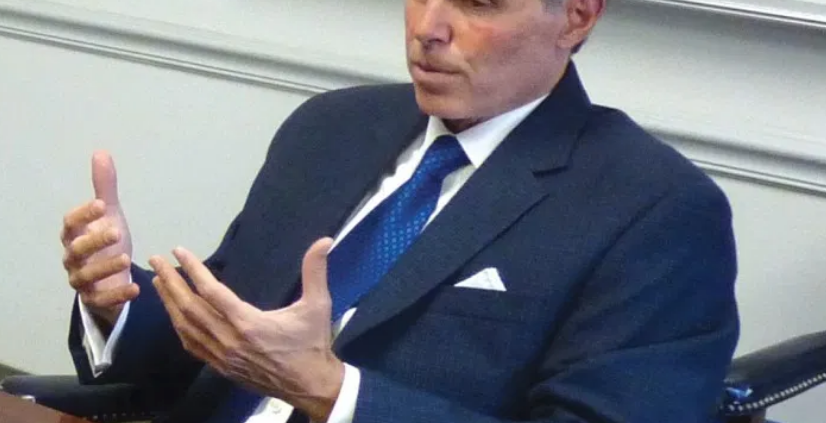In the 2017 “State of the City” Interview (part 1) Mayor Tarter promotes City’s investments in its future
City of Falls Church Mayor David Tarter voted in support of the City’s most expensive infrastructure plan in its history with the full Capital Improvement Plan last month, involving the massive undertaking of building a new George Mason High School and major renovations and expansions to the Mary Riley Styles Library, City Hall and parts of Mary Ellen Henderson Middle School. The new high school component, at a price tag of $120 million, will be on the ballot seeking approval by voters this November.
As citizens prime for the start of election season and in the aftermath following the vote, Tarter sat down with the News-Press for the annual “State of the City” conversation this week. In the first of a two-part feature, the mayor shared his views on why the plan is essential for the City and delved into the how the City is handling its development goals.
News-Press: Election season is right around the corner, what are you expecting see from it?
Tarter: Well, I’ll tell you I don’t know. We’ve got some new candidates, some new folks who are running for office, [so] I don’t know. But I’m looking forward to the turnout, the discussion, the dialogue, I think we’ll have a vigorous debate about the school and the referendum, which I think is very healthy for our community, and I’m looking forward to that conversation.
N-P: Are any of the new candidates bringing new ideas to the table or will they fit the mold of their predecessors?
Tarter: I’m familiar with the incumbents who’ve done some great work on [City] Council who bring a lot of knowledge and skills and dedication to the office, but I have to say I’m not as familiar with the new candidates so I’m looking forward to hearing their ideas for the future over the next couple months, so I can’t say for sure until I hear more from those folks.
N-P: The big ticket item on the ballot is the School Bond Referendum. Have you gauged the community’s level of support toward the referendum?
Tarter: I sense that people are supportive of the referendum, but there’s no polling in the City so it’s a bit of challenge to really understand where people are. Most people that I’ve spoken with seem to be supportive of the measure.
N-P: As an aside, do you think there should be some kind of polling to gauge community interest or would you rather the vote be the sole determinant?
Tarter: Let the vote decide. Your newspaper has a poll which I look at every week, and I know it’s not scientific but I do enjoy getting a flavor of what people are thinking and I look at the comments on your newspaper and some of the other online publications to get a flavor of what people are thinking. When you’re in office, you tend to hear a lot from other folks in office or other people on boards and commissions so it’s good to hear what the general public is thinking about.
N-P: Are you going to advocate for the referendum at all?
Tarter: There are some restrictions on how elected folks and the City itself can advocate for a referendum, so I’m going to take counsel from our city attorney and make sure I understand the limitations of what I can and can’t do as far as the participation with the referendum. But I do want to make sure as mayor that the public has as much information as possible. There are forums, resources and information available, so the public can make an informed decision come November.
N-P: Why did you vote for the referendum to be put on the ballot?
Tarter: First off, the school is reaching its capacity. There are a number of systems such as the roof, HVAC and other things that are starting to reach the end of their useful lives, so there is absolutely a need for this conversation and I think it is an appropriate time to be considering this. I think it’s something that can help the community, so, again, cognizant of what I can and can’t say, but I did and I think my vote speaks for itself.
N-P: Can you explain your reasoning for supporting the full CIP as well?
Tarter: The full CIP is an investment in our community’s future. We’ve had periods in time in the ‘50s and the ‘90s where we had to make substantial investment in our infrastructure to keep our community growing and improve and enhance what we’ve got here now, and now is one of those times.
Our school’s reaching the end of its useful life – 60-odd years old – and we have enrollment that’s growing that’s causing us to make it bigger anyway. We’re in that process with Mount Daniel. The library, City hall, George Mason High School, even Mary Ellen Henderson Middle School will have some changes as well if the referendum is approved. I think it’s appropriate, it’s an investment in our future. Our schools are fantastic right now, but with new and improved facilities they’re going to be better. This is really an investment in our community and I’m supportive of that.
N-P: Last year in your “State of the City” interview you said you wanted to hear from the people and what they thought should occupy the 10-acre plot of land designated for commercial development on the site of the new George Mason High School. What kind of input have you received from citizens?
Tarter: I have heard what people want – they want something special in our city. That could be entertainment, that could a sportsplex of some kind, an ice rink; something that brings the community together. I think the challenge with that is typically those sort of things are not very profitable, and so a developer that comes in will discount the land price because they’re not going to make as much money off an ice rink as they would on an apartment or some other use. So the balance we’ll need to come to grips with as a community is how do we balance the things that we want with the value that’s created by them and the value that could be created by some other use.
Really, the discussion that needs to happen more fully is ‘What’s the highest and best use of that land’ and how we may want to not necessarily take the highest and best use for the land, but put something else there that benefits the community in some other way, such as entertainment of some kind and how do we create a special place. That’s a discussion that I think is ongoing and will accelerate if this referendum is approved and it’s an appropriate discussion to figure out what’s the best thing for this land. We want to create a special place and enhance the sense of community we have already, and I think there’s some great opportunities for that with 10 acres of land situated very close to a Metro station.




